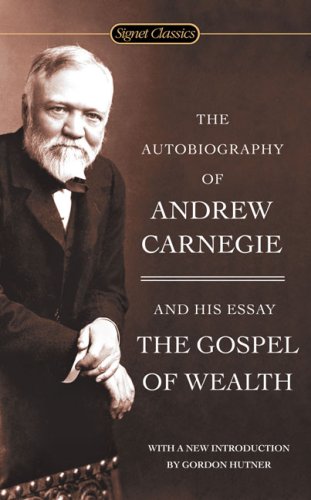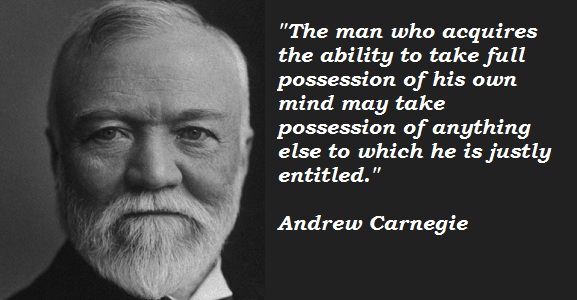
“Savage Wealth“, more commonly known as “The Gospel of Wealth“, is an article written by Andrew Carnegie in 1889 that describes the responsibility of philanthropy by the new upper class of self-made rich. Carnegie proposed that the best way of dealing with the new phenomenon of wealth inequality was for the wealthy to redistribute their surplus means in a responsible and thoughtful manner. This approach was contrasted with traditional bequest (patrimony), where wealth is handed down to heirs, and other forms of bequest e.g. where wealth is willed to the state for public purposes. Carnegie argued that surplus wealth is put to best use (i.e. produces the greatest net benefit to society) when it is administered carefully by the wealthy. Carnegie also argues against wasteful use of capital in the form of extravagance, irresponsible spending, or self-indulgence, instead promoting the administration of said capital over the course of one’s lifetime toward the cause of reducing the stratification between the rich and poor. As a result, the wealthy should administer their riches responsibly and not in a way that encourages “the slothful, the drunkard, the unworthy.”
Below is a short excerpt from the article:
I quote from the Gospel of Wealth published twenty-five years ago. This then is held to be the duty of the man of wealth. First: to set an example of modest, unostentatious living, shunning display; to provide moderately for the legitimate wants of those dependent upon him, and after doing so, to consider all surplus revenues which come to him simply as trust funds, which he is strictly bound as a matter of duty, to administer in the manner which in his judgment is best calculated to produce the most beneficial results for the community.
The man of wealth must become a trustee and agent for his poorer brethren, bringing to their service his superior wisdom, experience, and ability to administer. Those who would administer wisely must indeed be wise. For one of the serious obstacles to the improvement of our race is indiscriminate charity. It were better for mankind that the millions of the rich were thrown into the sea than so spent as to encourage the slothful, the drunken, the unworthy.
In bestowing charity, the main consideration should be to help those who help themselves. It provides part of the means by which those who desire to improve may do so; to give to those who desire to rise the aids by which they may rise; to assist but rarely or never to do all.
He is the only true reformer who is careful and as anxious not to lead the unworthy as he is to lead the worthy, and perhaps even more so, for in alms giving, more injury may be done by promoting vice than by relieving virtue. Thus, is the problem of the rich and poor to be solved.
The laws of accumulation should be left free; the laws of distribution free. Individualism will continue. But the millionaire will be but a trustee for the poor; entrusted for a season with a part of the increased wealth of the community, but administering it for the community far better than it did, or would have done, of itself. The best in minds will thus have reached a stage in the development of the race in which it is clearly seen that there is no mode of disposing of surplus wealth creditable to thoughtful and earnest men into whose hands it flows save by using it year-by-year for the general good. This day already dawns.
Men may die without incurring the pity of their fellows, sharers in great business enterprises from which their capital cannot be, or has not been withdrawn, upon which is left entirely a trust for public uses.
Yet the day is not far distant when the man who dies, leaving behind him millions of available wealth, which was free for him to administer during life, will pass away “unwept, unhonored, and unsung,” no matter to what use he leaves the dross which he cannot take with him. Of such as these, the public verdict will then be: the man who dies thus rich, dies disgraced. Such in my opinion is the true gospel concerning wealth, obedience to which is destined someday to solve the problems of the rich and the poor, to hasten the coming brotherhood of man, and at last to make our earth a heaven.
